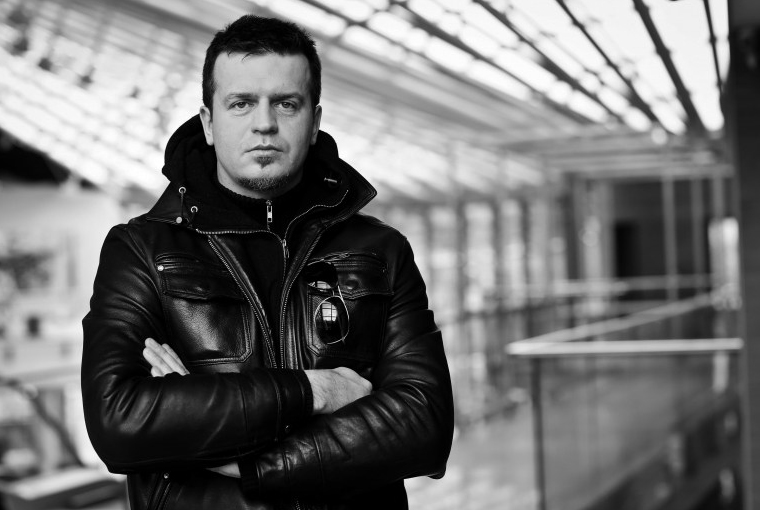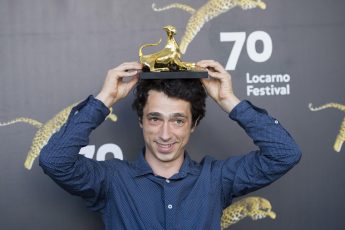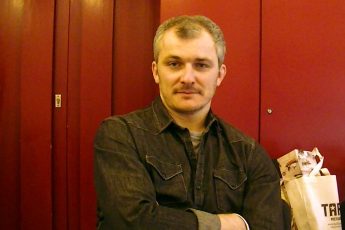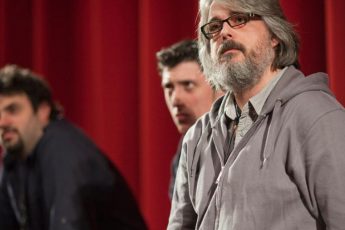
In his new film, Wrona tells the story of a relationship between a dying boxer and a young Vietnamese immigrant. We met Wrona in Paris to speak to him about the problem of immigration in Poland, his approach to acting and his upcoming projects…
Your film concentrates on a man who wants to father a child before he dies. Why do you think that legacy is so important for people? Do you think that it is more important for men than women?
I think it’s important for everyone, to leave something behind. This is my first film and I wanted to show something that was meaningful to me. My mother was dying at the time I was writing the screenplay and I wanted to make something that was an expression of this moment in my life. I collected some stories from real life I heard from different people. The main story was based on something from real life. I heard a story about a real boxer who found out he was going to die so he wanted to start a real life, this was something very tough for him. I was also a sportsman myself, so the screenplay was influenced by my life, too. I was trying to be the best. I wasn’t a boxer, I was a basketball player and I had to stop my basketball playing career because of an injury. Because it was my first movie I wanted to make a film about something important to me and to everyone. I think leaving something behind is very important, leaving something that’s good is the most important for everyone…Maybe it’s too pathetic but this was my idea…
Do you think that wanting a legacy has something to do with religion?
I chose this kind of character on purpose, you know, the tough boxer. Because this is the person without feelings, the uncomplicated person. The person had to change himself, he needed to find more subtle feelings. He discovers that he needs other people to make his life meaningful. I chose a tough guy on purpose, a tough guy who doesn’t care about other people
The female character in the film is a Vietnamese immigrant. Is this a story about immigration in Poland?
Yes, I think it’s the first Polish film about immigration in Poland. While writing the script I was wondering what is something that would make the film interesting. And I thought I’d show this picture of Warsaw with many Asian immigrants which would be something new because often Polish films show the same grey people living in the same grey country but we have a heavy immigration in Poland: many Russian people, many Asian people, many people from the Eastern part of our world come to Poland hoping for a better life.
I lived nearby the stadium, the main setting of the film. This is where foreign people come to create a new life and try to earn a living. I was very inspired by those people. They are living outside of society. There are a couple of thousand of those people in Warsaw, and no one wants to care about them. They have established a new quality of Warsaw. I wanted to show this new picture of Warsaw. Every month the government has to get one hundred of those Vietnamese people and send them back to Vietnam. The immigrants here don’t have a normal life, they are always under pressure.
How are immigrants seen in Poland?
Usually the Polish are open to other cultures but we don’t communicate with them because they live their lives in a separate part of the city. We are open to them, but we don’t have many chances to get closer to them. In the film we are trying to show that these immigrants live so close to our community but we don’t know why there is no connection between the two peoples. This is why the Polish boxer needs to learn to understand the Vietnamese people.
It’s the main actresses first film? (Lu de Luy who plays Yen Ha)
It was very hard to find a Vietnamese woman for this role. We looked for her in Paris as well but we couldn’t find someone of the right age. So we went to Vietnam, to Hanoi and did a casting and after the casting we found Lu de Luy. We were so happy to find her. She understood the script very well, but she was very young, like sixteen or something. But I felt that she wanted to play the role. During the casting we were discussing with her parents and explaining to them that there are many violent scenes so maybe she is too young for this part, at the same time she was drawing something and I thought to myself ‘Oh she is drawing kind of, you know, Mc Donald pictures’ (laughs) but then she showed us what she had written on the paper and she wrote “No problem!”, and so she was great. She’s kind of a teenage star in Vietnam, she stars in a TV series, she’s a top model but our film was her first serious work. I think she’s really talented. She has potential to be a Hollywood star. But, you know, Vietnam is a communist country. There are few serious roles for women, the image of Vietnamese women on television is that we see a woman crying, looking after her husband and crying all the time.
How did you deal with directing brutal and sexual scenes with someone so young?
Yes, it was very complicated. But the first thing was not to destroy her personal character.
The main male character was very professional. Every time she was feeling like maybe it was getting to be two much we did something else. Her mother was still in Poland and her mother was always around. She was very young so I had to go with her step by step because everything for her was very new.
When I was inviting her to Poland I dreamed that it would be very nice if I captured the moment that she changed from a girl to a woman. And I think that the moment that this changes in another person can be very interesting. But also this is a challenge for every director, not to go too far because it’s just a film, he doesn’t have to change all the actors lives.
Tell me about the main male actor? His role was a tricky one because he played someone who found out he is going to die and he is getting his affairs in order, how did you direct him?
I didn’t have any choice when it came to the actor because there is only one Polish actor who is also a boxer. While preparing for the movie we watched a movie about a Polish kick boxing champion, Marek Plotrowski, from the 80s. The story was very similar to that of the main character of the movie. When we watched the movie the actor really understood my expectations for this character. Finally, Marek Plotrowski performed the role of Igor’s trainer. He was a strong and prestigious motivation as part of our team. But I hadn’t known this story about this boxer before and was influenced by him. People might think I used his real life for my story but it wasn’t like that.
Do you have any film projects coming up?
I just finished another film called The Christening which is currently out in cinemas in Poland.
Now I’m going to have some rest in India because I’ve been working for three years and I really need to rest. For my next film I’m going to make a film about a woman living in a Polish ghetto during the Second World War. I think it will be great to make a film with women because there are more female actresses. Men are very shy in general.
Thank you for the interview.




Leave a Comment